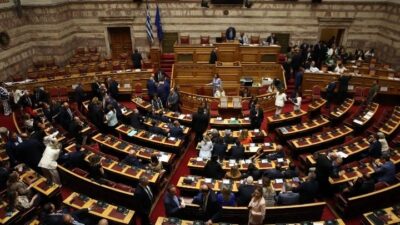Dimitris Mardas: Why Greece missed the “train” of industry – What Turkey did
06/01/2021
Turkey prioritizes spending billions of dollars on aeronautics (preparing its own 5th generation fighter jet for 2023), the defense industry (the government has signed $ 77 billion medium-term contracts with domestic companies), and the electronics industry (vehicle construction of all kinds), energy research ($ 13 billion by 2020) and telecommunications ($ 3 billion investment 2018-19). It is also building its third research-seismological vessel in its own shipyards (budget $ 100 million).
On the other hand, it is attracting foreign investment, greatly internationalizing its economy. It imports large quantities of intermediate and final products from the EU, exporting to the Union finished products. The strong interconnection of the economies of Turkey and EU member states can work, either positively for Turkey (avoidance of sanctions as it will cause a lot of damage) or negatively (as an element of intimidation-blackmail).
We are now experiencing the positive manifestation of these relations through the EU’s lukewarm reactions vis-a-vis sanctions against it. In addition, several EU member states have recently invested 120 billion euros in Turkey, with Spain leading the way, which has invested 64 billion euros! While Turkey emphasizes the aforementioned strategic sectors, Greece gives priority (see for example “Recovery Plan” of November 2020) to the endless modernization of the state, the energy upgrade of buildings, culture, gender diversification, tourism facilities, green transport, roads, bridges, circular economy, etc.
On the other hand, a set of horizontal measures (tax exemptions, enhanced depreciation, etc.) is offered for the benefit of all companies, but without any developmental strategy, able to cover the unprecedented backwardness of the country in industry. Everything is necessary and everything must be done, but the priorities that serve not only the economy but also the geopolitical position of the country should take precedence.
What should Greece do?
There is a lack of targeted action in favor of large investments in industry and tourism as well as innovative solutions, which move beyond the logic of the small and medium. On the other hand, the knowledge of basic obstacles-limitations that the Greek economy faces is absent. Indeed, some may not have realized that the country is in the south-eastern Mediterranean and not close to Ireland or Belgium.
So models for best practices to follow are not those of Spain, Ireland, the Netherlands but of Israel and South Korea. The last two countries, through investments in the defense industry, with the help of which electromechanics and research are developed, have become technological giants.
In this context, given both the investment gap of 130 billion euros in the period 2010-19, the industrial backwardness that the country is experiencing and the obstacles we face from our competitive environment (ie Turkey), our reactivation in aeronautics, in the production of defense equipment – two sectors we abandoned – in the electromechanical sector and in the industry of assembling intermediate products, will give a new impetus to the economy, creating on the other hand dynamic poles that will positively affect other sectors of the economy.
Industry and investments
This orientation will keep scientists in the country, will strengthen it defensively and technologically, will keep the skilled human capital that has migrated, while at the same time it will boost industrial exports, start-up companies, etc. attracting investment in sectors (eg vehicle production) that we are now unable to service. On the other hand, through the dynamic development path guaranteed by the above, we reduce those obstacles associated with the geopolitical pressures that the country is facing.
The Pissaridis report, acting as a government guideline, with special emphasis outlines the country’s backwardness in industry and corporate investments. We would expect the Greek Government’s “Recovery Plan” to move on the rails laid out by this report, but it does not, with the result that industry remains the country’s biggest patient once again.
Thus, orientations and targeted actions in favor of industry, as indicatively noted above, are absent from the new development strategy of the country, as outlined in the “Recovery Plan”. The “Recovery Plan” would be a good starting point for the country’s new industrial orientations and priorities.





